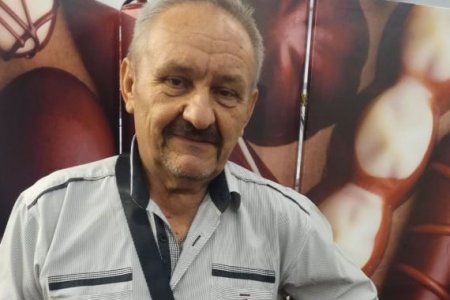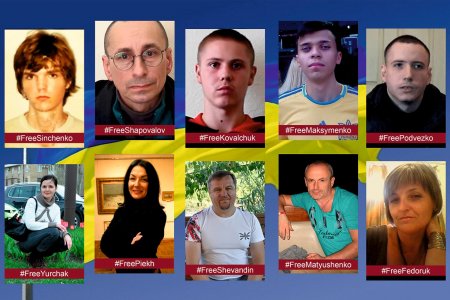
There was huge anticipation in all parts of Ukraine, including those under Russian occupation, at the promised exchange of prisoners by Ukraine and Russia. As well as Ukrainian prisoners of war, known to be tortured and held in horrific conditions, Russia is also holding a huge number of Crimean Tatar and other Ukrainian political prisoners, as well as civilian hostages, many of whom have no procedural status and are simply imprisoned.
With only one thousand prisoners to be released, disappointment was, perhaps, inevitable, however there is also bitter frustration. As reported, the families of many men and women taken hostage in occupied Donbas in 2018 or before, feel that their loved ones have been abandoned, and are losing any hope. The same is true of the huge number of Crimean Tatar and other Ukrainian political prisoners who have been in Russian captivity for many years, including some whose lives are in immediate danger. In the exchange of prisoners from 23 – 25 May, Russia released only one political prisoner, Pavlo Zozuliuk, a resident of occupied Kakhovka (Kherson oblast) whose politically motivated sentence was, in any case, about to end.
Each side freed 880 prisoners of war. There were, however, no members of the Azov Regiment, although a huge number have been in Russian captivity since they were taken prisoner while defending Mariupol in 2022. It is known that they have endured especially savage torture and horrific conditions, and many of them have been sentenced to 20 years and more on absolutely surreal ‘terrorism’ charges. Anger over the lack of any Azov POWs in the exchange was expressed by Azov Commander Denys Prokopenko who asserted that, instead, a “scumbug” who had asked the Russian guards for a knife against other Ukrainian prisoners, had been freed.
It is not clear that Prokopenko’s criticism of the Ukrainian authorities is entirely fair. Judging by available reports, it does not sound as though there was much scope for negotiation as to who was released. This would not, however, be the first time that Russia or its proxies in occupied Donbas have made controversial decisions about prisoners they released, with one aim doubtless being to stir up discontent and anger at the authorities in Ukraine.
The most difficult, and contentious, aspect lies with the civilians released. Here, too, there was numerical parity, with Ukraine releasing 120 prisoners, convicted of crimes against Ukraine’s national security. According to Mediazona, Russia’s highly specific ‘human rights ombudsperson’ Tatyana Moskalkova, called these individuals ‘political prisoners’. While there are some grounds for concern about Ukraine’s law on collaborating, it is very unlikely that international observers and human rights NGOs would share Moskalkova’s assessment.
Russia, on the other hand, began seizing huge numbers of civilian hostages from the beginning of its full-scale invasion of Ukraine, and there may be thousands illegally imprisoned in Russia or occupied Ukraine. Some have faced illegal ‘trials’ under Russian legislation and received long sentences, but in many cases, it is unclear whether they have any official status at all. This is not surprising as Russia knows perfectly well that all such seizures of civilians are in violation of international law. This does, however, mean that there are no mechanisms for forcing Russia to release the civilian hostages, unlike the means available for negotiating exchanges of prisoners of war. With respect to political prisoners, these including all those civilian hostages seized on occupied territory and then subjected to kangaroo court trials, the situation is usually still further complicated by the fact that Russia has made it impossible to live on occupied territory without taking Russian citizenship. It then claims that the Ukrainian political prisoners are ‘Russians’ and refuses to release them.
There were, in short, hundreds of recognized political prisoners, civilian hostages, some of them held incommunicado since 2022, and also many hostages first seized in occupied Donbas in 2017 or 2018 whom Russia could have included in the 120 civilians it handed over to Ukraine
It handed over one political prisoner, Pavlo Zozuliuk who was abducted twice by the Russians who invaded and are occupying Kakhovka. Although certainly a victim of political persecution, Zozuliuk was one of the very few who have received a relatively short (2-year) sentence. Even if the Russians pretended that he had been seized in late August 2023, when they almost certainly tortured him into taking part in a staged and videoed ‘arrest’ (and not, as was the case, a month earlier) he was still due to be released very soon.
According to KHPG Director Yevhen Zakharov, the other 119 people returned to Ukraine included 15 men who had been convicted of crimes in Ukraine prior to Russia’s full-scale invasion of Ukraine and who had been illegally taken to Russia from prison colonies in occupied Kherson oblast. Zakharov notes that the Russians took around three thousand such prisoners altogether, with this also in flagrant violation of the Geneva Convention relative to the Protection of Civilian Persons in Time of War. Russia generally tries to foist its citizenship on these Ukrainian prisoners, however very many refuse. Graty spoke with one such former prisoner, Oleksiy, who confirmed that many had refused to take Russian passports. Ukraine was his country, he said. Yes, they had committed crimes, “but we’re not traitors. They wanted us to pass on the location [of Ukrainian military]. They bombed my home, drove my children into a cellar and I’m supposed to work for them?”
Once released, those who do have passports, try to leave for Ukraine, either through Georgia or though corridors that, from time to time, appear between Ukraine and Russia, Zakharov explains. Human rights NGOs, such as ‘Support for Ukraine’s Prisoners’ step in and help get them back to Ukraine.
The problem is that many do not have documents. As reported, Andriy Kolomiyets, a Ukrainian political prisoner who served the whole of a 10-year sentence on legally surreal charges, should have been freed in January this year. Instead, he is held in a deportation centre in Krasnodar, along with other Ukrainians, some of whom have been held prisoner there for up to 18 months.
According to Hanna Skrypka from “Support for Ukraine’s Prisoners’, the 15 prisoners whom Russian deported as part of the exchange last weekend including three men whose sentences have not ended, and who will serve them now in Ukraine.
The other 104 civilians released are Ukrainians who had been serving sentences in Russian prisons for crimes committed in Russia and, following their sentences, had also ended up in detention centres. Zakharov acknowledges that many of his colleagues feel frustrated that Russia did not hand over political prisoners but insists that all Ukrainians held in Russia should be released, regardless of who they are and how they ended up there.
This is certainly true, however many of the political prisoners have been held prisoner for years, in appalling conditions and at distances from their families that make virtually any visits impossible. In the vast majority of cases, this is in reprisal for their human rights journalism or activism in occupied Crimea, their unconcealed support for Ukraine and / or protest against Russia’s war of aggression. A very large percentage of these political prisoners will have faced horrific forms of torture (as have prisoners of war), with this likely to have caused permanent damage to their health. There are also many political prisoners who, even by Russian standards, should not have been imprisoned because of their state of health. Russia has already caused the death of at least five political prisoners Dzhemil Gafarov; Kostiantyn Shyrinh; Viktor Demchenko; Oleksandr Ishchenko, and 27-year-old Ukrainian journalist Victoria Roshchyna. It is near certain that Oleksandr Ishchenko and Victoria Roshchyna died as a result of torture, as did Yevhen Matveyev, Mayor of Dniprorudne, whose mutilated body was returned to Ukraine in December 2024, almost three years after he was abducted by the Russian invaders.
Imprisoned Crimean Solidarity journalist Amet Suleimanov has grave heart issues which place his life in direct jeopardy. The same is very likely true of 74-year-old Vitaly Atamanchuk, who had serious medical conditions even before his abduction and torture seven years ago. These are just two of a large number of political prisoners whose age and / or medical condition make continued Russian captivity, without adequate medical treatment, akin to torture. They should have been released this week, and publicity is desperately needed to ensure that they do not die in Russian captivity.



